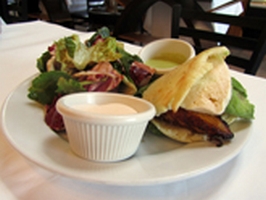This colorful cafe serves authentic Venezuelan food to guests who have discovered and embraced the exuberant South American flavors.
BEVERLY HILLS, Calif. August, 2012 Introducing an unfamiliar cuisine to guests takes explaining says Camelia Coupal, partner in Cafe Coupa in  Beverly Hills and six other locations; five in Palo Alto, California, one in Caracas, Venezuela.
Beverly Hills and six other locations; five in Palo Alto, California, one in Caracas, Venezuela.
“We’ve had guests ask for tortilla chips and are upset that we don’t have them,” Coupal shares. Once they actually try the food on the menu though, guests are immediately delighted with the tastes; they are familiar, yet unique and different.

One Venezuelan mainstay consumed from breakfast to dinner is the arepa. This gluten-free cornmeal griddle cake makes great sandwiches, which are then filled with cheese, beef, chicken salad, or vegetables. Not to be missed is Cami’s (see photo) queso guayanes (soft white cheese), avocado, sweet fried plantains, nata (an addictive kind of sour cream), and guasacaca, a sauce made with avocado, garlic, oil and vinegar; thinner than guacamole, and a wonderful discovery.
Although most order from the Venezuelan choices, the menu at Coupa has a section called Coupa Specialties with a typical blend of salads, paninis, pasta, and burgers for less adventurous diners.
Breakfast includes both American and Venezuelan items, and the not-to-be-missed coffee drinks include variations unique to the country such as guayoyo, similar to an Americano, and marron, a Venezuelan version of the latte. Besides a variety of coffee classics, the barista menu also includes Abuela hot chocolate with Venezuelan bittersweet chocolate and Spicy Maya hot chocolate balancing hints of pasilla, cayenne peppers, and cinnamon.
Just 28, Coupal moved here from Venezuela to attend Stanford University in Palo Alto where the first Coupa Cafe was opened eight years ago by her parents.
Coupal completed a degree in African studies and traveled to Africa after college for volunteer work; “It’s so poor, but also magical,” she says.
During her time there she lived as they do, without electricity or water, often with only rice to eat. Compared to Africa she says, even the poorest in Venezuela have plentiful in food and basics. She continues to support orphans there by visiting, teaching, and providing necessities.
Her parents now run the coffee roasting part of the business in Caracas and ship directly to California the only Venezuelan “shade grown, handpicked, patio sun-dried, super fair trade, organic, single-estate Arabica coffee beans roasted in small batches.”
According to Coupal, Venezuela’s current leader Chavez makes it difficult for growers to export their famous coffee, thus making it unprofitable to grow. Their company works directly with coffee farmers in Venezuela and 12-ounce bags are available on their site for $10 to $17. Her website and cafes are the only place to get Venezuelan coffee stateside.
Coupal’s time is divided monthly with a week or so in Beverly Hills and the rest of the month in Palo Alto. She’s responsible for all aspects of the business, from purchasing to administration.

“Our food is not a cuisine, and the gourmet side is minimal. It’s rice, beans, corn, and plantains,” Coupa digresses. The national dish, Pabellon, is comprised of shredded beef, black beans, sweet fried plantains, arepitas, nata, and queso blanco.
Another traditional dish on the menu is Polvorosa de pollo (see photo). This distinctive version of a chicken potpie comes in a shortbread style crust filled with a sweet-savory mix of shredded chicken, raisins, tomatoes, onions, and spices.

Share an order of the Degustacion (see photo) for a generous mix of Venezuelan appetizers. The dish includes mini empanadas filled with meat or cheese, fried mini arepas with chicken salad, mini cachapas, tequenos, and maracuchitos.
The cachapas are corn pancakes made with grated fresh corn so sweet and fresh; they’re a revelation. Tequenos are always at parties, which is exactly what you’d expect from white cheese sticks wrapped in dough and deep fried. The maracuchitos are plantain-wrapped hard cheese that are also fried. Coupal faced a challenge finding the right cheese to use several melted away during cooking but has succeeded now for an irresistible sweet/salty bite.















